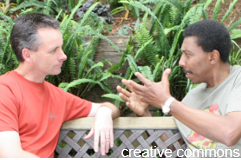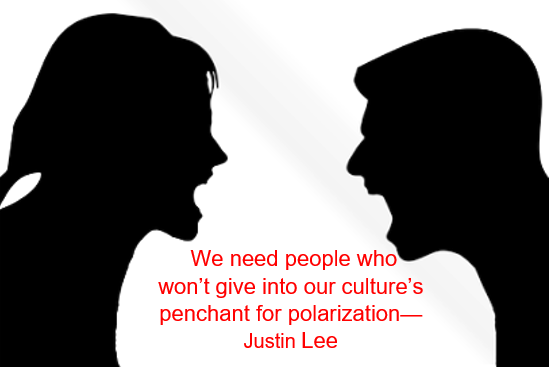|
THREE BOOKS OFFERING PRAGMATIC ADVICE ON PRODUCTIVE, STRATEGIC DIALOGUE. We need people who won’t give into our culture’s penchant for polarization. Because that polarization is killing us and the only way out …. is sitting down to talk your opponents, to listen to them, to try to understand how they see the world and why they do what they do, and to become a voice they will listen to... Justin Lee, Talking Across the Divide: How to Communicate With People You Disagree With.” I would like to see political discussion conducted with less tribal animosity and instead with more mutual respect and reasoned deliberation. Arnold Kling, The Three Languages of Politics ….[T]here is a big problem with behaving as though politics is a sport when we are focused on winning as a political imperative. Our civic participation should be about finding the best solutions possible under the circumstances, about trying to serve everyone who shares this country. Sarah Stewart Holland and Beth Silvers, I Think You’re Wrong (But I’m Listening). The books linked in this post take you to smile.amazon.com. Purchasing through this link supports the work of the non-profit Enrichment Alliance of Virginia, which I manage. All of these books can be purchased through other vendors, including your local bookstore, which also needs your support.  All three of these books go beyond simply lamenting the divisions in our society. Each offers pragmatic advice on taking part in productive, strategic dialogue. While there is overlap in these books, they offer different tools for constructive conversation. All of the tools are critical, so just as I would not approach a construction project with only one type of tool, I would not try to have constructive conversations without the tools provided in all of these books.  When you talk with someone who disagrees with you on issues you care about deeply, it probably isn’t your goal to have an unproductive conversation. And yet, that may be the best outcome you can expect. Perhaps even more likely, your efforts at advocacy may be counterproductive. The very language you use to support your points is likely to confirm your listeners’ beliefs that you espouse a wrongheaded world-view. I found The Three Languages of Politics eye-opening. Arnold Kling describes the different languages liberals, conservatives, and libertarians use, and how, because the same phrases can mean radically different things, our efforts to engage in dialogue may actually intensify polarizations. You cannot have a productive dialogue if you cannot even communicate. Expressions such as "individual rights," "oppression" and "law and order" have drastically different emotional impact depending on political affiliation. If you understand how your words resonates with your listeners, you have a chance at genuine communication.  Understanding the views of someone from a different party does not mean you need to change your own party loyalty. Kling emphasizes this in his book, as do Holland and Silvers in I Think You’re Wrong (But I’m Listening). Hosts of the podcast, Pantsuit Politics, the authors model "grace filled conversations" in which a Democrat and a Republican "take off their team jerseys" to gain a deep understanding of often divisive topics such as welfare and the environment. The authors invite us to recognize that most issues are nuanced, and that looking at these issues only through the lens of political affiliation can blind us to solutions that address complex problems. Holland and Silvers are two open-minded woman committed to breaking down the binary, either/or way we typically look at things. Rather than arguing, they bring their different perspectives into their discussions in order to view issues from different angles. They are much more interested in understanding each other than persuading each other. I was invigorated by their approach and am trying to stop looking at the world first as a Democrat and only second as a rational woman, eager to learn. Still, I know there will be times when my primary goal will be to change minds. And I know there will be times when I'll want to talk to people whose minds seem closed to what I have to say. For that, I need additional tools in my toolbox.  Knowing where you stand on an issue and wanting to persuade others people does not mean you don’t need to listen. Listening is every bit as central to Justin Lee’s approach as it is to Holland and Silvers. While the latter are as focused on changing their own minds as on changing one another’s minds, Lee's book is more directly about persuasion. Lee is a gay Christian from an evangelic background. Most of his work is about bridging the gap between LGBTQ people and people who view non-heterosexual relationships as sinful. In Talking Across the Divide, he shows us how to apply the strategies he uses in his own work when we enter into conversations about other divisive topics. With ample research and fascinating studies backing him up, Lee systematically lays out barriers to changing minds, and effective strategies for addressing these barriers. I found these strategies so compelling that I took notes for regular review. Polarization is killing us, Lee says. This is not figurative language. People are actually killing each other over political differences that are. not. insurmountable. If you are as fed up as I am with the linear, binary, us vs. them mindset that consumes our country, read all three books and apply them as you begin to engage in dialogue that is not destructive, but constructive.
0 Comments
Your comment will be posted after it is approved.
Leave a Reply. |
Archives
October 2022
Categories |



 RSS Feed
RSS Feed